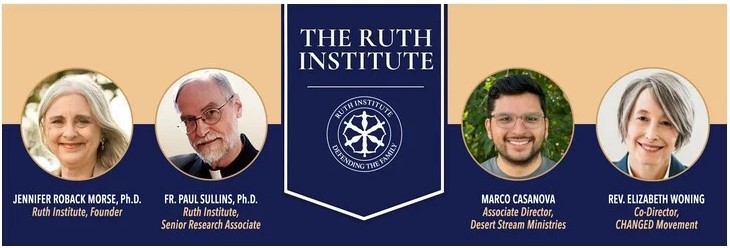By Jennifer Roback Morse Published on June 2, 2024
Unless you’ve been living on another planet since 2021, you are no doubt aware that June has been declared “Pride Month” across the United States. So at the Ruth Institute, we plan to spend the next four weeks discussing a topic you aren’t likely to hear about from anyone else.
We are going to talk about people who have journeyed away from an LGBT identity and are now living happy, fulfilled lives. In fact, that information is so suppressed in mainstream sources that you may never even have heard that many people have at one time, in one way or another, identified as lesbian or gay, but no longer do so.
We think society would benefit from including their voices in the conversation about the meaning of human sexuality and its place in a well-lived life. Therefore, we are proclaiming the first Sunday in June to be “Ex-Gay Visibility Day.” So we’ll be featuring conversations with people who have made that journey on our Locals channel — the free-speech alternative to YouTube. We’ll also be talking with therapists and other experts who have accompanied them on their journeys.
How Many Ex-Gays Are There?
Everyone knows that millions of people identify as gay, lesbian or bisexual. (I’m going to leave the “transgender” issue aside for the purposes of this discussion. Those who identify that way have a unique set of circumstances to which I cannot do justice here.)
Ruth Institute Senior Research Associate Fr. Paul Sullins has been studying people’s current behavior, self-identification, and patterns of attraction with what they reported five years ago. Though I have been aware for some time of people who have journeyed away from homosexual identities, and am proud now to call some of them friends, I had no idea how many people fit that description until I looked at Fr. Sullins’s charts.

He estimates that at least as many people have journeyed away from a homosexual identity as those who currently embrace one. In the United Kingdom, there are slightly fewer ex-gays than men who currently call themselves gay, and decisively more ex-lesbians than current lesbians. Taken together, “ex-gays” and “ex-lesbians” in the UK outnumber those who continue to identify with those labels!

Likewise in the US, there are a LOT more ex-lesbians than ex-gay males, producing the same overall result: more people who formerly identified as gay or lesbian, than those who currently do.
Nurture, Not Nature
Why don’t we hear more from ex-gay people? As I mentioned earlier, it may be that their stories are being suppressed. The very existence of psychologically healthy people who have journeyed away from an LGBT identity suggests that the “born gay” narrative cannot be the whole story.
The best modern science has already cast substantial doubt on the “born gay” claim. Genetic studies and others conducted on identical twins show indisputably that being gay is nothing like being left-handed. “Gay” is not “the new black.” Sexual orientation is a complex set of thoughts, feelings, behaviors, self-identification — and yes, let us say it plainly: for some people it’s also a set of political commitments. It would be astonishing if that whole complex could be an “inborn immutable trait.”


